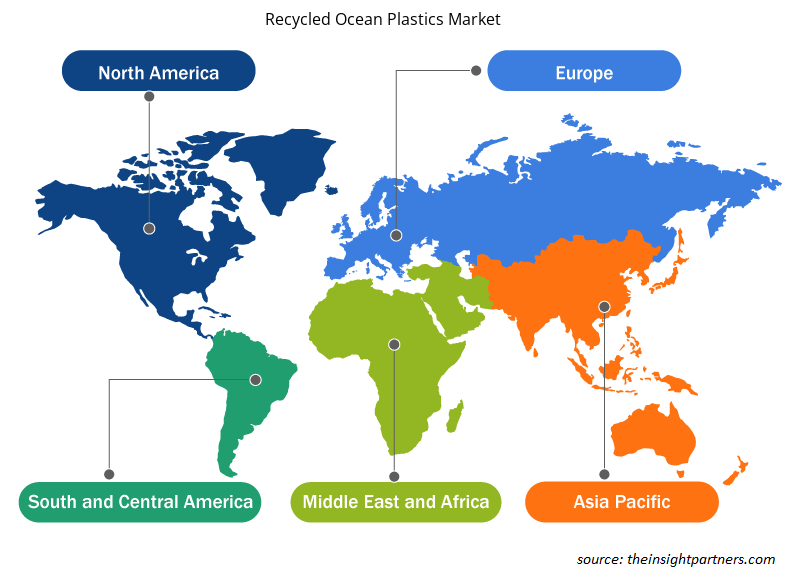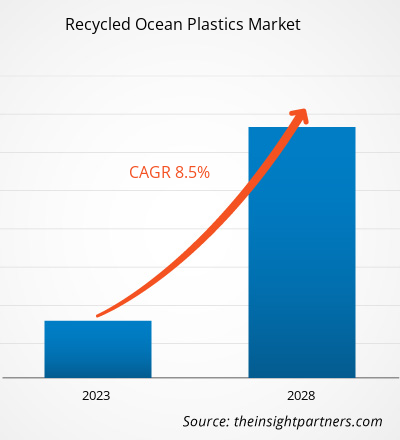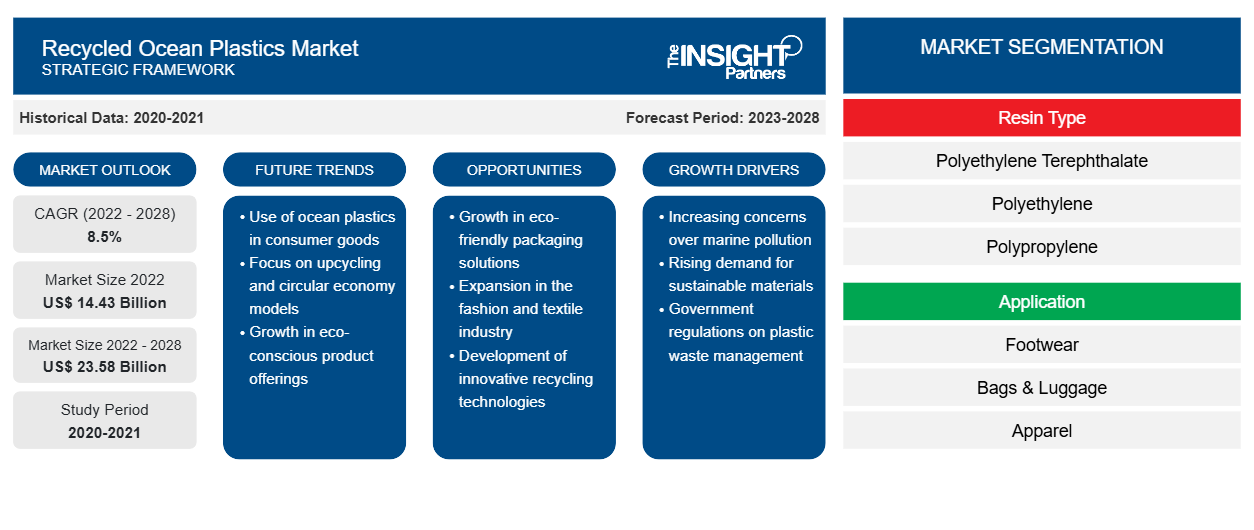El tamaño del mercado de plásticos oceánicos reciclados se valoró en US$ 14.432,91 millones en 2022 y se espera que crezca a una CAGR del 8,5% entre 2022 y 2028.
La contaminación por plástico es una de las principales preocupaciones debido a su impacto negativo en los organismos vivos. Cada año, se vierten toneladas de residuos plásticos en los océanos y las vías fluviales, lo que perjudica al ecosistema marino. Por ello, los fabricantes se están centrando en reciclar los residuos plásticos del océano y en producir productos útiles, como calzado, bolsos, maletas, carteras y ropa, a partir de estos plásticos.
En 2021, Asia Pacífico tuvo la mayor participación en los ingresos del mercado mundial de plásticos oceánicos reciclados . El mercado de Asia Pacífico está segmentado en India, China, Australia, Japón, Corea del Sur y el resto de Asia Pacífico. El crecimiento del mercado de plásticos oceánicos reciclados en la región está impulsado por la rápida expansión de la industria de la moda, el aumento de la población y la creciente conciencia de los consumidores sobre las soluciones sostenibles en toda la región. China e India se encuentran entre los países con la población de más rápido crecimiento. Debido al crecimiento de la población, las industrias del calzado, el embalaje y la construcción se están desarrollando rápidamente en la región. Las crecientes iniciativas de los fabricantes regionales para reducir la huella de carbono mediante la producción de productos ecológicos también impulsan el crecimiento del mercado de plásticos oceánicos reciclados en la región.
Personalice este informe según sus necesidades
Obtendrá personalización en cualquier informe, sin cargo, incluidas partes de este informe o análisis a nivel de país, paquete de datos de Excel, así como también grandes ofertas y descuentos para empresas emergentes y universidades.
-
Obtenga las principales tendencias clave del mercado de este informe.Esta muestra GRATUITA incluirá análisis de datos, desde tendencias del mercado hasta estimaciones y pronósticos.
Impacto de la pandemia de COVID-19 en el mercado de plásticos oceánicos reciclados
La creciente demanda de materiales sostenibles y respetuosos con el medio ambiente en las industrias del calzado, la indumentaria, el embalaje y la construcción estaba impulsando la demanda de plástico oceánico reciclado antes del inicio de la crisis de la pandemia de COVID-19. Sin embargo, en 2020, los gobiernos de varios países impusieron confinamientos para controlar la propagación de la infección por SARS-CoV-2, lo que detuvo las operaciones de las unidades de reciclaje de plástico, lo que provocó una escasez de plásticos oceánicos reciclados. Según un informe publicado por GA Circular, el 80% de las unidades de reciclaje en India, Vietnam y Filipinas estuvieron cerradas durante los primeros meses de 2020, lo que provocó una escasez significativa de plásticos reciclados . Esto tuvo un impacto adverso en el crecimiento del mercado de plásticos oceánicos reciclados.
En 2021, muchas economías reactivaron sus operaciones. Los gobiernos de varios países relajaron las restricciones impuestas anteriormente y permitieron a los fabricantes operar a plena capacidad. Este factor tuvo un impacto positivo en las actividades de reciclaje de plástico. Muchos gobiernos y ONG están construyendo una sólida infraestructura de gestión de residuos para apoyar la economía circular y minimizar la amenaza de los residuos plásticos en los ecosistemas marinos. Este factor impulsaría la demanda de plásticos oceánicos reciclados durante el período previsto.
Perspectivas del mercado
Aumenta el lanzamiento de productos fabricados a partir de plásticos reciclados del océano
La contaminación plástica es un problema mundial acuciante debido a la importante amenaza que supone para los organismos vivos. Según las estadísticas proporcionadas por el Portal Ocean Literacy de la Organización de las Naciones Unidas para la Educación, la Ciencia y la Cultura, los residuos plásticos representan aproximadamente el 80% de la contaminación marina total, y entre 8 y 10 millones de toneladas métricas (MMT) de plástico terminan en el océano cada año. Además, se espera que el volumen de microplásticos en los océanos aumente significativamente en el futuro. Sin embargo, la conciencia sobre la contaminación plástica en los océanos ha aumentado en muchos países, y los gobiernos y los organismos reguladores están tomando iniciativas para reciclar estos plásticos. Muchas empresas están lanzando productos innovadores y atractivos, como calzado, bolsos y billeteras, gafas de sol y ropa, utilizando plásticos oceánicos reciclados para lograr sus objetivos de sostenibilidad y reducir su huella ambiental general. Todos estos factores mencionados impulsan el crecimiento del mercado de plásticos oceánicos reciclados.
Información sobre los tipos de resina
Según el tipo de resina, el mercado mundial de plásticos oceánicos reciclados se segmenta en tereftalato de polietileno (PET) , polietileno (PE), polipropileno (PP), poliestireno (PS) y otros. El segmento de tereftalato de polietileno tuvo la mayor participación en el mercado en 2021. La facilidad de extracción de tereftalato de polietileno (PET) de los océanos y las vías fluviales debido a su mayor peso y capacidad para mantener su forma está impulsando el crecimiento del mercado en el segmento. Además, la creciente demanda de PET oceánico reciclado para aplicaciones de bolsos, maletas y calzado también está impulsando el crecimiento del mercado en la región.
Información sobre aplicaciones
Según la aplicación, el mercado mundial de plásticos oceánicos reciclados se segmenta en calzado, bolsos y maletas, ropa, materiales de construcción y otros. El segmento de la ropa tuvo la mayor participación de mercado en 2021. Se espera que la creciente demanda de ropa de la industria de la moda y el crecimiento de la población mundial impulsen la necesidad de plástico oceánico reciclado en la industria textil en los próximos años.
Aquafil SpA; BIONIC; Tide Ocean SA; Oceanworks; Textil Santanderina; Envision Plastics; OceanYarn; Waste2Wear; Unifi, Inc.; y SABIC se encuentran entre los actores que operan en el mercado de plásticos oceánicos reciclados. Estas empresas están realizando importantes inversiones en I+D para desarrollar productos innovadores que satisfagan las nuevas necesidades de los consumidores. Los actores del mercado se centran en proporcionar productos de alta calidad para satisfacer la demanda de los clientes.
Perspectivas regionales del mercado de plásticos reciclados en los océanos
Los analistas de Insight Partners explicaron en detalle las tendencias y los factores regionales que influyen en el mercado de plásticos oceánicos reciclados durante el período de pronóstico. Esta sección también analiza los segmentos y la geografía del mercado de plásticos oceánicos reciclados en América del Norte, Europa, Asia Pacífico, Oriente Medio y África, y América del Sur y Central.

- Obtenga datos regionales específicos para el mercado de plásticos oceánicos reciclados
Alcance del informe sobre el mercado de plásticos oceánicos reciclados
| Atributo del informe | Detalles |
|---|---|
| Tamaño del mercado en 2022 | US$ 14,43 mil millones |
| Tamaño del mercado en 2028 | US$ 23,58 mil millones |
| CAGR global (2022-2028) | 8,5% |
| Datos históricos | 2020-2021 |
| Período de pronóstico | 2023-2028 |
| Segmentos cubiertos |
Por tipo de resina
|
| Regiones y países cubiertos |
América del norte
|
| Líderes del mercado y perfiles de empresas clave |
|
Densidad de actores del mercado de plásticos oceánicos reciclados: comprensión de su impacto en la dinámica empresarial
El mercado de plásticos reciclados del océano está creciendo rápidamente, impulsado por la creciente demanda de los usuarios finales debido a factores como la evolución de las preferencias de los consumidores, los avances tecnológicos y una mayor conciencia de los beneficios del producto. A medida que aumenta la demanda, las empresas amplían sus ofertas, innovan para satisfacer las necesidades de los consumidores y aprovechan las tendencias emergentes, lo que impulsa aún más el crecimiento del mercado.
La densidad de actores del mercado se refiere a la distribución de las empresas o firmas que operan dentro de un mercado o industria en particular. Indica cuántos competidores (actores del mercado) están presentes en un espacio de mercado determinado en relación con su tamaño o valor total de mercado.
Las principales empresas que operan en el mercado de plásticos reciclados del océano son:
- Aquafil SpA
- BIÓNICO
- Marea Ocean SA
- Obras oceánicas
- Textil Santanderina
Descargo de responsabilidad : Las empresas enumeradas anteriormente no están clasificadas en ningún orden particular.

- Obtenga una descripción general de los principales actores clave del mercado de plásticos oceánicos reciclados
Informe Destacado
- Tendencias progresivas de la industria en el mercado de plásticos oceánicos reciclados para ayudar a los actores a desarrollar estrategias efectivas a largo plazo
- Estrategias de crecimiento empresarial adoptadas por los mercados desarrollados y en desarrollo
- Análisis cuantitativo del mercado de plásticos oceánicos reciclados de 2020 a 2028
- Estimación de la demanda mundial de plásticos oceánicos reciclados
- Análisis de las cinco fuerzas de Porter para ilustrar la eficacia de los compradores y proveedores que operan en la industria
- Avances recientes para comprender el escenario competitivo del mercado
- Tendencias y perspectivas del mercado, así como factores que impulsan y restringen el crecimiento del mercado de plásticos oceánicos reciclados
- Asistencia en el proceso de toma de decisiones destacando las estrategias de mercado que sustentan el interés comercial, lo que conduce al crecimiento del mercado de plásticos oceánicos reciclados.
- El tamaño del mercado de plásticos oceánicos reciclados en varios nodos
- Descripción detallada y segmentación del mercado, así como la dinámica de la industria de los plásticos oceánicos reciclados
- Tamaño del mercado de plásticos oceánicos reciclados en varias regiones con prometedoras oportunidades de crecimiento
Mercado mundial de plásticos reciclados de los océanos
El mercado mundial de plásticos reciclados de los océanos se segmenta por tipo de resina en tereftalato de polietileno (PET), polietileno (PE), polipropileno (PP), poliestireno (PS) y otros. Por aplicación, el mercado se segmenta en calzado, bolsos y maletas, indumentaria, materiales de construcción y otros.
Perfiles de empresas
- Aquafil SpA
- BIÓNICO
- Marea Ocean SA
- Obras oceánicas
- Textil Santanderina
- Visualizar los plásticos
- Hilo oceánico
- Residuos para el uso
- Unifi, Inc.
- SABIC amón
- Análisis histórico (2 años), año base, pronóstico (7 años) con CAGR
- Análisis PEST y FODA
- Tamaño del mercado, valor/volumen: global, regional y nacional
- Industria y panorama competitivo
- Conjunto de datos de Excel
Informes recientes
Informes relacionados
Testimonios
Razón para comprar
- Toma de decisiones informada
- Comprensión de la dinámica del mercado
- Análisis competitivo
- Información sobre clientes
- Pronósticos del mercado
- Mitigación de riesgos
- Planificación estratégica
- Justificación de la inversión
- Identificación de mercados emergentes
- Mejora de las estrategias de marketing
- Impulso de la eficiencia operativa
- Alineación con las tendencias regulatorias























 Obtenga una muestra gratuita para - Mercado de plásticos oceánicos reciclados
Obtenga una muestra gratuita para - Mercado de plásticos oceánicos reciclados